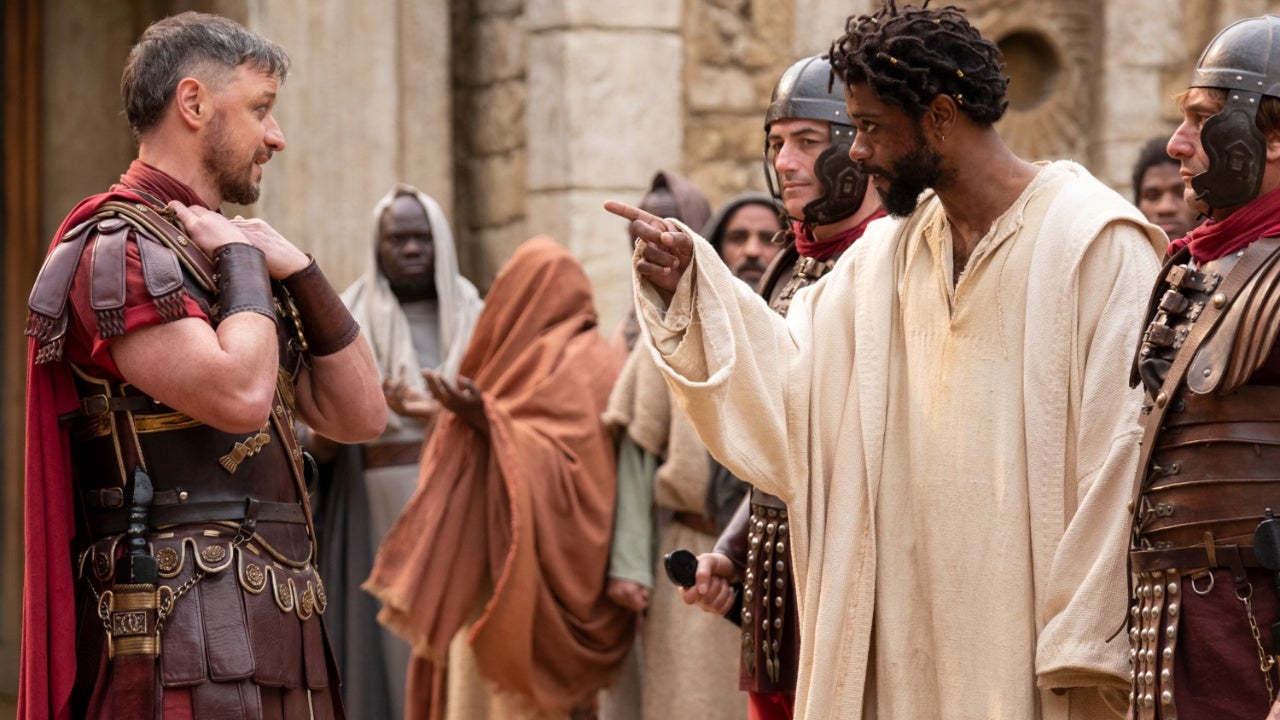
Director Jaymes Samuel knocked it out of the park with 2021’s The Harder They Fall making his feature length debut on Netflix to good critical reception and a splash on social media. Three years later, he’s ready to make his first appearance on the big screen with his follow-up effort. The Book of Clarence follows its titular character Clarence (Lakeith Stanfield) in 33 AD Jerusalem as he and his friend Elijah (RJ Cyler) try to make a better life for themselves through all means of schemes and plots. The duo soon find themselves in debt to local kingpin Jedediah (Eric Kofi-Abrefa) with a need to figure their way out of it. Captivated by the power and glory of the rising Messiah Jesus Christ of Nazareth (Nicholas Pinnock), Clarence decides to emulate Jesus by staging fake miracles of his own in order to raise the needed funds to escape his debt. In the course of doing so, Clarence will find out much about both himself and the world around him.
The crux of this film’s premise is an underachieving, oft disrespected commoner who seeks to recreate the adulation of Jesus Christ of Nazareth for himself the only way he knows how, through fraud and deception. The actual depiction of Clarence’s rise as a messiah is not very convincing however due to issues with pacing. Clarence’s ascension is shown through a montage of his travels and faux miracles alongside Elijah, their friend Zeke (Caleb McLaughlin), and former gladiator slave Barabbas (Omar Sy). It happens mostly in a blur and the lack of established connection and emotion with the populace that Clarence is scamming and Clarence himself, it makes their resulting belief and devotion less believable. Had there been at least one or two scenes which depicted a fleshed out interaction between Clarence and a crowd where he convincingly sells them on a manufactured miracle, bringing them into his charade, his gaining a following would feel more real. Instead, the montage of scenes set to music of him doing poorly executed frauds played mostly for laughs makes the entire premise feel shoddy and therefore incomplete.
While the story of Clarence’s journey to becoming one of the messiahs of Jerusalem could have been better executed, where The Book of Clarence does shine is in its depiction of Clarence as a conflicted man who aspires to be someone or something greater than he is, but without a clear path on how to get there. During the aforementioned montage of his misdeeds in faking his religious divinity, images are interspersed of closeups of a contemplative Clarence battling his conscious on what he is doing and who he is becoming. Clarence is portrayed throughout the film as a non-believer of Christianity, but also as someone who knows right from wrong and has some goodness in his heart. This point is best established when Clarence seeks to prove his worthiness to his twin brother Thomas (played by Stanfield in a dual role) and the rest of Jesus’ disciples by freeing the gladiator slaves held in Jerusalem. While part of his larger plot to free himself of his debt to Jedediah, Clarence’s persistence in appealing to slave holder on why the slaves should be freed is indicative of his latent goodness despite his motives. The Book of Clarence reinforces this aspect of the character steadily throughout and Stanfield’s performance possesses the perfect amount of subtlety that makes the trait feel natural and believable as portraying someone battling their conscience and true self. This is where the film works and ultimately where its bright spots reside.
The Book of Clarence has many positives, it wears its influences on its sleeve, opening with an entertainingly well done homage to Ben Hur’s iconic chariot racing scene and asking some poignant questions about faith in both a higher power and oneself. Has the film focused on this aspect more concisely, it would’ve been all the better for it. Yet, it ultimately spends too much time continuously harping on Clarence’s lack of faith more than his inner conflict as well as his romance with Jedediah’s sister, played by Anna Diop. That a film whose runtime exceeds two hours also covered a major plot point like Clarence’s rise as a faux messiah in a visual montage rather than something more fleshed out also contributes heavily to its feeling of a lack of focus. The humor in the film works for the most part however, avoiding any tonal issues. The film’s historical accuracy did feel a little jarring however and slightly took this reviewer out of the movie a bit as its depiction of Romans is too Westernized in its racial commentary as opposed to accurately portraying how the Roman Empire truly operated. The Book of Clarence is ultimately a film with an interesting concept that doesn’t fully execute it.
Image: Sony Pictures Releasing

